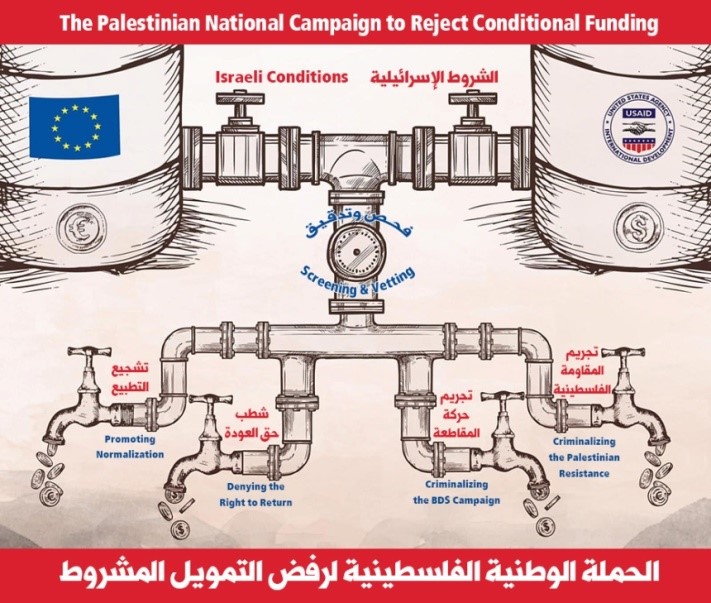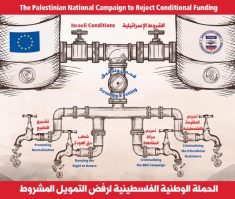Background on PNGO
The Palestinian NGO Network (PNGO) is an umbrella framework with 135 NGO members based in Gaza and the West Bank. (PNGO does not publish a list of its members; the information below on the participation of NGOs with links to the PFLP terror group is taken mainly from the NGOs’ websites.)
PNGO enjoys generous funding from the European Union (EU)1 and other international donors for the stated purpose of strengthening, coordinating, and networking among Palestinian civil society. PNGO2 also enjoys permanent representation in the UN’s Humanitarian Country Team, which coordinates all international aid in Gaza and the West Bank. This comes with a seat on the advisory board of the UN’s humanitarian pooled fund, which is designated for emergencies, granting PNGO decision-making power in selecting the fund’s beneficiaries.
PNGO’s Rejection of Anti-Terrorism Funding Requirements
This is not the only example of PNGO opposing conditions on funding. It has previously rejected anti-terrorism funding language, defended Palestinian “resistance,” and blocked normalization with Israel and Israelis:
- In June 2017, PNGO condemned Norway for pulling funding from a youth center named after Dalal Mughrabi – a terrorist who in 1978 murdered 37 civilians, including 12 children – asserting that “there is a difference between freedom fighters and terrorists.” PNGO later scrubbed the statement from its website (preserved on “Internet Archive”: “PNGO Condemns Norway demanding PA return funds for Center Named after Dalal Mughrabi”).
- In April 2017, PNGO called on the international community not to “use aid to undermine legitimate Palestinian resistance.” According to PNGO, “We reject all de-legitimization or criminalization of lawful Palestinian resistance, whether in form of allegations of terrorism, anti-semitism or otherwise… We call on all governments and aid providers to respect our right to lawful resistance, support Palestinian human rights defenders, and ensure equal, impartial and transparent access to funding for all.”
- According to a 2013 study commissioned by the UN, PNGO “stated that its members would not sign funding agreements that included the ATC [Anti-Terror Certificate]. This is now a condition for membership under PNGO byelaws [sic].”
- In 2013, PNGO condemned the EU Partnership for Peace program for encouraging “normalization between Palestinian and Israeli civil society organizations.”
- In 2008, PNGO was one of the authors of “The Palestinian NGOs Code of Conduct,” which obliges members to “be in line with the national agenda without any normalization activities with the occupier, neither at the political-security nor the cultural or developmental levels.” In other words, if an NGO wishes to promote cultural exchange between Israelis and Palestinians—a form of normalization—it will not be represented by PNGO, putting their funding at risk.
- In 2007, PNGO spearheaded a boycott of USAID funding following the introduction of anti-terrorism clauses in grant agreements.
PNGO ties to the PFLP terror group
Walid Hanatsheh (Abu Ras) is listed as a PNGO board member on behalf of a PFLP-linked NGO, Health Work Committees (HWC), and is the HWC finance and administration manager.
- Hanatsheh was arrested in October 2019, alleged to be the leader of PFLP “military” operations in the West Bank.
- According to a December 12, 2019 indictment in Israeli military court, he commanded Samer Arbid, who has been charged for leading the PFLP terror cell that carried out an August 2019 bombing attack that murdered 17-year-old Rina Shnerb, and injured her father and brother (on file with NGO Monitor).
- According to an Israeli media report, Hanatsheh bankrolled the bombing.
PNGO describes Ashraf Abu Aram as “a human rights defender and advocacy officer of Palestinian NGO Network (PNGO).” According to a November 2019 statement by PNGO, Abu Aram was arrested by the Israeli security forces (November 7, 2019) and “was transferred under ‘administrative detention for four months.’”
A 2012 report in Haaretz identified Abu Aram as a PFLP member who was arrested for “allegedly planning to kidnap an IDF soldier in order to bring about the release of PFLP leader Ahmed Sa’adat from an Israeli jail.” According to the Israel Security Agency (Shabak), “Abu Aram already contacted a local weapons dealer in an effort to obtain two pistols and an automatic rifle with which to carry out the planned abduction.”
Several PNGO member organizations have ties to the PFLP terror group:
- Union of Agricultural Work Committees (UAWC), which has a seat on PNGO’s board3
- HWC, which also has a board seat4
- Addameer, “executive member”5 of PNGO, according to Addameer’s website
- Al-Dameer6
- Union of Palestinian Women’s Committees (UPWC)7
Samer Arbid and Abdel Razeq Farraj, both senior UAWC employees, were arrested in 2019 for their alleged involvement in the August 23, 2019 bombing attack (see above).
- Samer Arbid: According to Israeli security officials, Samer Arbid commanded a PFLP terror cell that carried out the bombing against Israeli civilians. According to the Israel Security Agency (Shabak), Arbid prepared and detonated the explosive device.
- According to Arabic-language media, Arbid worked as the accountant of the UAWC at the time of his September 2019 arrest.
- Abdel Razeq Farraj: According to his indictment, he authorized the bombing.
- According to Farraj’s LinkedIn profile, Farraj is the “Administrative Manager at Union of Agricultural work Committees.” An August 2018 Amnesty International document refers to him as the “Finance and Administration Director” at UAWC
Footnotes
- PNGO is a partner of a current €261,914 European Union grant titled “torture is a humiliation of dignity;” In 2016-2019, PNGO was a co-grantee of a €446,482 EU grant titled “Contributing to the respect, protection and promotion of the right to association in the Gaza Strip.”
- Together with the Association of International Development Agencies (AIDA), a network of international NGOs in the West Bank and Gaza.
- PNGO, “Board members,”: http://www.pngo.net/board-members/
- PNGO, “Board members,”: http://www.pngo.net/board-members/
- Addameer, “Our Work”: http://www.addameer.org/about/our-work
- Al-Dameer, “Evacuation of Responsibility”: https://www.aldameer.org/en/Evacuation%20of%20Responsibility.html
- UPWC, “عن الإتحاد” :https://upwc.ps/?page_id=408










